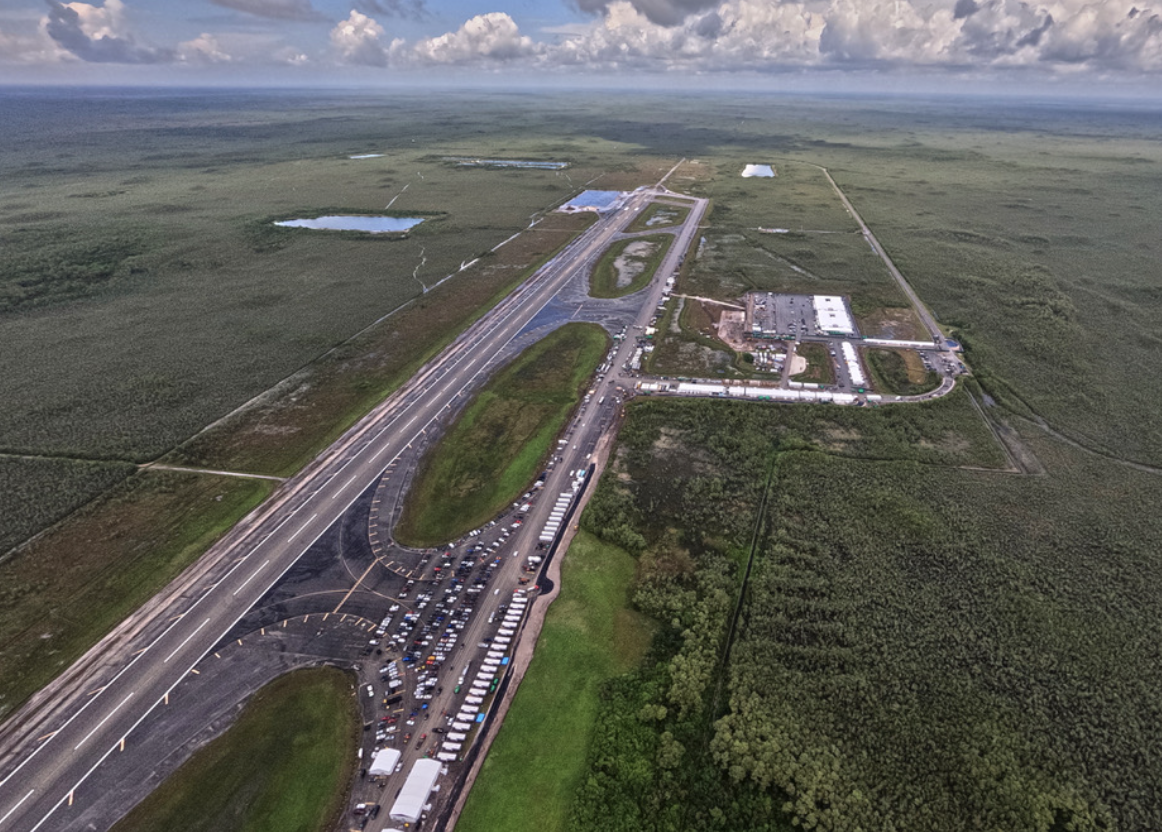
- Details
- By Levi Rickert
Opinion. The Miccosukee Tribe has lived in Florida’s Big Cypress National Preserve since time immemorial. Today, 640 tribal members still call the Everglades home.
Their ancestral home now has an unwanted neighbor: a massive immigrant detention center that sits less than 1,000 feet from Miccosukee villages. It was hurriedly built by the state with encouragement and promised funding from the Trump administration. Both ignored a basic requirement — consulting the tribe about building on their ancestral land.
This isn't the first time officials have planned grandiose development in the Everglades without consulting the tribe.
In the late 1960s and early 1970s, the Miccosukee Tribe fought the proposed Everglades Jetport, an airport that would have been built along U.S. Highway 41, halfway between Miami and Marco Island. The proposed airport would have been five times the size of New York’s John F. Kennedy Airport.
Environmental studies showed the jetport would devastate the Everglades ecosystem. Armed with these studies, the Miccosukee, environmental groups and conservationists successfully stopped the project.
President Nixon halted construction in 1970. Only one runway was completed.
The airstrip remained, used for decades to train pilots. In late June, Florida converted it into the detention center, dubbed “Alligator Alcatraz.” President Trump and Homeland Security Secretary Kristi Noem toured the site July 1.
On July 15, the Miccosukee filed a motion to join a lawsuit filed June 27 by Friends of the Everglades and the Center for Biological Diversity to shut down Alligator Alcatraz.
Miccosukee Chairman Talbert Cypress told me in an interview that filing this lawsuit wasn’t something the tribe took lightly. He said it was done after exhausting other avenues, including lobbying members of Congress.
Cypress said there was no tribal consultation by federal officials or state officials. He voiced the concerns that go back decades about the environmental impact the prison will have on his tribal community and the surrounding area.
The environmental stakes are high in the Everglades. Big Cypress is not empty swampland — it is a crucible of biodiversity, home to Florida panthers, manatees, and dozens of threatened species. The facility’s rapid eight-day construction skipped NEPA-required environmental studies. Wastewater, lighting, paving, and heavy equipment threaten to unravel decades of Everglades restoration.
“We are also mindful of the citizens of Florida too. I don’t know if they fully understand how important the Everglades are to every citizen of Florida. That’s where we get our drinking water from,” Cypress said. “The ecosystem is a very unique ecosystem. So, putting this facility in the middle of this fragile ecosystem is detrimental, not just for us, not just for our tribal members, but for all Floridians.”
The construction of Alligator Alcatraz bypassed treaties, ignored tribal sovereignty and flouted federal law. But this fight isn't just about tribal rights — it's about shared values. The Miccosukee Tribe is right on every front of this issue: sovereignty, environment, human rights, and federal overreach. Whether you care about constitutional law, ecological preservation, or human dignity, the Miccosukee Tribe's battle against 'Alligator Alcatraz' is your fight too.
The courts must halt operations immediately and demand a genuine, legally compliant review. Congress must investigate the diversion of disaster dollars and hold accountable those who prioritized politics over people. And Florida must commit to a humane, lawful, and just immigration approach—one that respects tribal rights and ecosystem integrity.
The Miccosukee Tribe demands immediate action. This is our fight too. Whether you're defending tribal sovereignty, protecting the Everglades, or opposing government overreach — join them.
Thayék gde nwéndëmen - We are all related.
More Stories Like This
The SAVE America Act Threatens Native Voting Rights — We Must Fight BackThe Presidential Election of 1789
Cherokee Nation: Telling the Full Story During Black History Month
Jesse Jackson Changed Politics for the Better
Native News Online at 15: Humble Beginnings, Unwavering Mission
Help us defend tribal sovereignty.
At Native News Online, our mission is rooted in telling the stories that strengthen sovereignty and uplift Indigenous voices — not just at year’s end, but every single day.
Because of your generosity last year, we were able to keep our reporters on the ground in tribal communities, at national gatherings and in the halls of Congress — covering the issues that matter most to Indian Country: sovereignty, culture, education, health and economic opportunity.
That support sustained us through a tough year in 2025. Now, as we look to the year ahead, we need your help right now to ensure warrior journalism remains strong — reporting that defends tribal sovereignty, amplifies Native truth, and holds power accountable.
 The stakes couldn't be higher. Your support keeps Native voices heard, Native stories told and Native sovereignty defended.
The stakes couldn't be higher. Your support keeps Native voices heard, Native stories told and Native sovereignty defended.
Stand with Warrior Journalism today.
Levi Rickert (Potawatomi), Editor & Publisher


